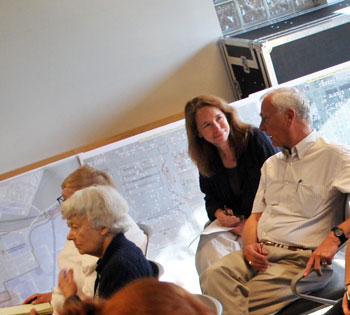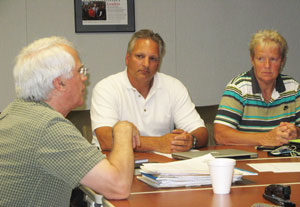The July 13 partnerships committee meeting of the Ann Arbor Downtown Development Authority drew an audience of around 35 people, many of them prominent community members.

Before the start of the July 13 DDA partnerships committee meeting. Back row: Kit McCullough, Peter Allen. Front row: Vivienne Armentrout (partially obscured), Mary Hathaway. (Photo by the writer)
Based on the committee’s May and June meetings, many in the audience expected the committee to come up with some kind of recommendation for a public engagement process that would ultimately lead to alternate uses of some downtown city-owned parcels. The parcels currently serve as part of the public parking system. The context of the DDA’s planning for the public engagement effort is a city council resolution, approved on April 4, 2011, that outlined a detailed plan for the DDA to lead the process.
The so-called parcel-by-parcel plan emerged in late 2010 as part of “mutually beneficial” committee meetings that handled negotiations lasting over a year between the city of Ann Arbor and the DDA on a new parking contract. Under the new contract, which the two bodies finally ratified in May 2011, the DDA will continue to operate the city’s public parking system for the next 11 years.
The city council’s approval of the parcel-by-parcel plan in April and DDA partnerships committee meetings in May and June – the three months prior to Wednesday’s meeting – had provided some momentum towards translating the city council resolution into an actual timeline with action steps.
In fact, two attendees of Wednesday’s meeting had pitched their professional services to the DDA to lead that public engagement process, with events tied to tentative calendar dates. Doug Kelbaugh, former dean of the University of Michigan’s college of architecture and urban planning, and Kit McCullough, a lecturer at the college, had provided a detailed timeline of meetings they could host during the fall, with delivery of a concept plan in January 2012, which could then be used to craft requests for proposals from developers.
If the process would not be led by Kelbaugh and McCullough, the committee was expected by many in attendance at its Wednesday meeting to chart some other path forward. But that’s not where the conversation led. DDA board member John Mouat described it as a “far-reaching, vague conversation,” which he had expected it would be. At one point, committee members even expressed uncertainty about whether the DDA or the city council would lead the process.
Typically, DDA executive director Susan Pollay gleans specific direction from the vaguest of conversations by her board’s committees. But when asked by Mouat at the conclusion of the meeting if she had clear direction, Pollay allowed only that she felt like she had more direction than before the meeting.
Based on the conversation at the meeting, part of that direction is that some kind of timeline for the process – which committee members thought would take at least a year – should, if possible, be included in an October 2011 city council working session.
In a follow-up phone interview, Pollay told The Chronicle that having the October 2011 working session as a target for a proposed plan would allow the committee and the full board to use their meetings over the next two months to work on the content of that presentation to the council. Checking in with the council on the public process before settling on it, she said, was important to the board. [Full Story]










